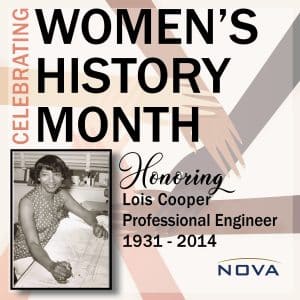 March 27, 2023
March 27, 2023
This week we’re learning from the life and legacy of Lois Cooper for leading groundbreaking transportation projects, serving as president of the Los Angeles Council of Black Professional Engineers, and helping hundreds of students discover themselves in engineering careers.
Lois Cooper, born in 1931 in Vicksburg, Mississippi, developed an early interest in math. She credited this interest to teachers who drew connections between math and application—something that would stick with her throughout her career—and her willingness to take challenges head-on.
Cooper graduated with a degree in Mathematics from Los Angeles State College in 1954 after first studying law at Tougaloo College in Mississippi. She became the first African-American woman to work for the California Department of Transportation (CALTRANS) in 1953. She began at CALTRANS as an engineering aide and progressed to become a transportation engineer and project manager for major transportation projects.
Her journey in taking and passing the engineering license exam was not an easy one. After taking the Fundamentals of Engineering (FE) exam several times without passing, she did not take no for an answer and went back to school for engineering —while working, raising two kids, taking care of an ill husband, and dealing with medical challenges herself. She graduated, passed the EIT, then passed the PE exam on her first try.
She became a student member of the Society of Women Engineers (SWE) in 1978 and was elected to the SWE College of Fellows in 1990. Cooper became the first woman president of the Los Angeles Council of Black Professional Engineers (LACBPE) in 1971. In her retirement, she worked with the Council by visiting schools to talk to students about considering engineering as a profession. This program educated students about the importance of math and science classes. For years after, she would help tutor math and science on Saturdays to more than 100 students.
In an interview for the Society of Women Engineers, Cooper was asked to provide advice to other women in engineering. Her response was, “Don’t try to shame anybody. I don’t care who it is. You can know all the information in the world, don’t make somebody else feel bad about it—about the fact that they don’t know. There’s a way you can teach somebody something without making them feel ashamed.”
Sources: Engineering and Technology History Wiki (ethw.org); IBTTA.org; wtsinternational.org

